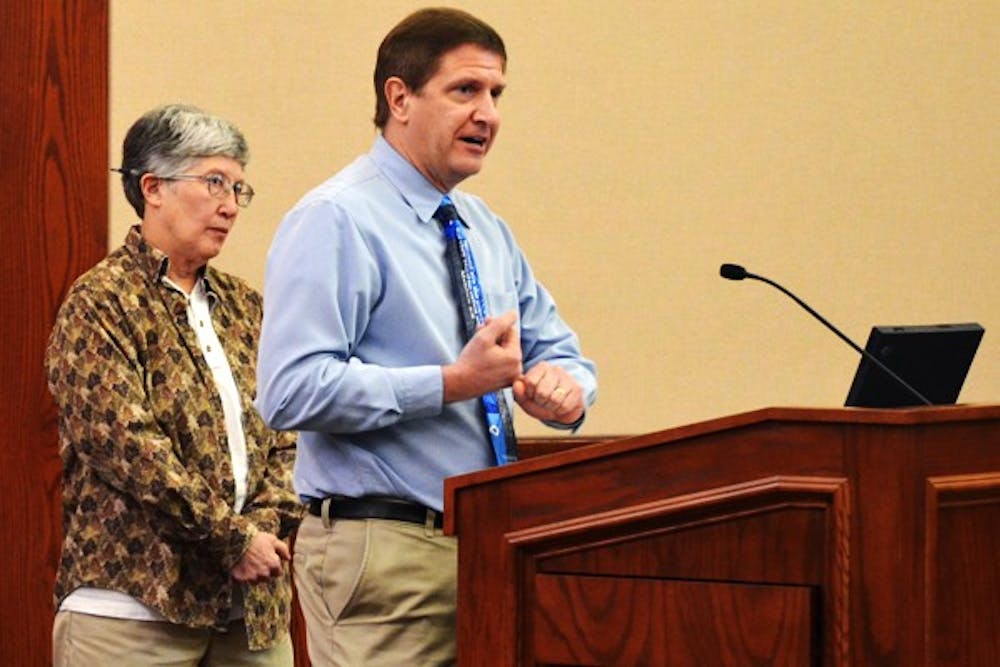Local group presents benefits of proposed anti-discrimination ordinance; City Commission hears support, opposition

Many of them said they came for one thing — justice.
More than 150 people filled the meeting room at City Hall, 320 W. Broadway St., on Monday a few minutes before the City Commission to hear a formal presentation on a proposed anti-discrimination ordinance.
Norma Bailey, spokeswoman for the group who drafted the ordinance, had been waiting to make the presentation for months, ever since she and others in the room Monday first showed up to back the idea at a November meeting.
With recognition on Monday’s agenda, Bailey and local United Methodist pastor, Charlie Farnum, came ready with a powerpoint, a review of support data and a few stories of local discrimination to demonstrate need.
“We have come here tonight because we support the basic rights of jobs, housing and accommodations,” Bailey said, momentarily pausing, “for everyone.”
She told commissioners they were to receive a list of 701 people who live or work in Mount Pleasant and support the ordinance. All of it, she said, was collected via an online petition and signed postcards.
“The bottom line is we want you to pass the ordinance,” Bailey said.
Commissioners held a work session with the city attorney earlier this month to discuss the logistics of the proposed ordinance.
Bailey on Monday referenced multiple questions commissioners had and said organizers were prepared to discuss which areas of the draft needed to be changed.
Concerns among commissioners included the benefits of a civil infraction penalty versus private court action each time a discrimination complaint would be filed and alternative parties aside from the city manager that could be responsible for handling complaints.
The proposed ordinance was drafted to be all-inclusive and prevent discriminatory acts against people of more than a dozen demographics, including sexual orientation and gender identity.
Currently, the state’s Elliott-Larsen Civil Rights Act does not cover the later two categories, and legislation has been introduced to lawmakers that would aim to prohibit municipalities from adopting regulations that could supersede it.
But several people, who spoke Monday during public comment in support of Mount Pleasant’s proposed ordinance, said the local movement isn’t about homosexuality.
Support and opposition
The Rev. Wayne Nicholson, an ordained priest at St. John’s Episcopal Church of Mount Pleasant, said it is a conversation about human dignity, and affording gay, bisexual or transgender people the ability to “move freely through society” without fear.
“As long as we as a class are not named in anti-discrimination legislation, we can and will be singled out and denied our full humanity,” he said. “My right to receive respect regardless of my perceived sexual orientation must not be questioned in the United States of America, much less in Mount Pleasant, Michigan.”
More than 10 people lined up to speak in favor of the ordinance. Among them was Union Township Zoning Administrator Woody Woodruff, Laura Gonzales, chairwoman for the Isabella County Human Rights Committee, and Central Michigan University junior Virginia Bernero, a Lansing native who spoke on behalf of College Democrats.
Only one person addressed the meeting strictly in opposition of the ordinance. Bill Johnson, president of the Fremont-based American Decency Association, who said he had been invited by people he knows in Mount Pleasant to speak against the movement “that insists on promoting gayness as a legitimate lifestyle.”
He said he was also asked to speak in Holland last summer when the city was considering an all-inclusive anti-discrimination law, in which case, the local movement in favor was unsuccessful.
“It’s a slippery slope …” Johnson said. “As in Holland, there may be many people that did show up (in support), but they also knew there were many in the community that didn’t show that were opposed to it. I believe they honored those people.”
Mayor Bruce Kilmer said he has received a few emails from people in opposition to the ordinance, though not all were clear on reasons why.
He emphasized to the meeting’s attendees that the City Commission has not endorsed or opposed the draft.
“What we’re going to be doing is study it further and look at it, getting more input, more information (and) working with the people that proposed it,” Kilmer said. “Then it would be decided whether or not to adopt such an ordinance.”



